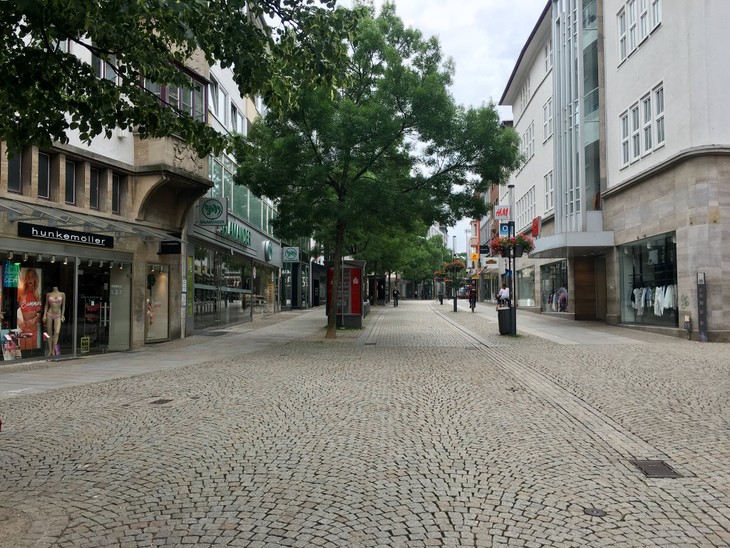(VOVWORLD) - Germany’s long, rich history contains many strange cultural anomalies. One of them is Closed Sundays. In this week’s Cultural Rendezvous, Christian Oster, a former German journalist, will tell us about this custom.

Sundays are quiet days in Germany - by law (Photo: infomigrants.net)
|
Bao Tram: Hello, Chris. Thanks for joining us.
Christian Oster: Hello. My name is Christian Oster. I come from Germany. I have been living in Vietnam for almost 20 years now and it has become my homeland.
Bao Tram: Well, Chris, today will talk about Closed Sundays, a strange German custom. Why do you call it Closed Sundays?

Christian Oster, a German native, was a journalist for many years.
He worked for the Goethe Institute in Hanoi doing public relations and restaurant management.
He has been living in Vietnam for almost 20 years now.
He is running his company Hanoikultour and working as a manager for the "Illu-Bar" and the "Cinematheque Hanoi".
|
Christian Oster: It is not only the Sunday on which no work is allowed, but also all other holidays. This legally decreed rest has nothing to do with vacations. Rather, this regulation has a historical background, as we will hear shortly.
In contrast to Vietnam, Germany is a Christian country. One of the ten commandments from the Bible says: "And on the seventh day you shall rest". Sunday is to be celebrated as the day of God. The Sunday commandment required all believers to participate in the Sunday holy mass.
In the course of the 19th century, however, the everyday order that protected Sunday as a day of rest broke down. Sunday increasingly became a working day.
It was not until the founding of the Federal Republic of Germany that Sunday rest was enshrined in a law on working hours. However, the individual states could make different decisions on which stores were allowed to open and which were not.
Bao Tram: How did Closed Sundays begin?
Christian Oster: Sunday has been considered a day of rest for hundreds of years. The Roman emperor Constantine introduced a first law more than 1,600 years ago. In this law it was said: all judges, city dwellers and craftsmen shall rest on a reverent Sunday. With some exceptions, this is still practiced in Germany today.
Bao Tram: How do you describe a closed Sunday in Germany?
Christian Oster: When I was in Germany with my Vietnamese wife a few years ago, we went out into the streets on a Sunday morning at about 9:00 am. It was deserted and quiet. My wife was visibly irritated: "Where are all these people"?
In Vietnam, people meet seven days a week at the market or in the street. It’s quite different in Germany. People of faith go to church, others meet with friends and take a trip to the country. It's all about relaxation, about switching off and recovering from six days of work.
Bao Tram: You said earlier that Sunday rest was enshrined in a law on working hours, so how can people get access to basic services or public entertainment premises on Sunday?
Christian Oster: Although the labor law does not allow work at all on Sundays and holidays, according to the Federal Statistical Office, in 2013 more than one in four employees, i.e. 28%, went to work on weekends occasionally or regularly. For comparison: in 1992, the percentage of weekend workers was still 20.6 %. Most of them work in professions that are excluded from the Working Hours Act, for example, emergency and rescue services, as well as police and fire department. Hospitals and other facilities for the treatment, care and support of persons are of course open, but also restaurants, radio stations and news agencies. On Sundays you can also go to theater performances, film shows or concerts without any problems. Sports events are part of it as well as fairs and exhibitions.
These exceptions have led to the fact that now also public libraries, call centers or lottery stores registered their claims in order to be able to work on Sunday. Here, however, the Supreme Administrative Court made a landmark decision in 2014 and clearly rejected the request. So Sunday remains a bit sacred in Germany after all.

The main shopping street of Hildesheim on a Sunday. Only cafés are open. Strong trade unions and Christian Democrat support combine to keep Sunday for families. (Photo: Samuel West/twitter)
|
Bao Tram: So what do German people often do on Sunday?
Christian Oster: Whoever wants to have his peace as a Christian believer goes to church. But you can also simply sleep in until the morning. You can get on your bike and go for a walk in the forest with friends. You can also visit a restaurant with your family so that you don't have to cook at home. Everyone is free to decide for themselves and according to their needs.
Bao Tram: Thank you so much, Chris, for joining us today and telling us about Closed Sundays. We wish you all the best in life and work.
Christian Oster: You’re welcome!